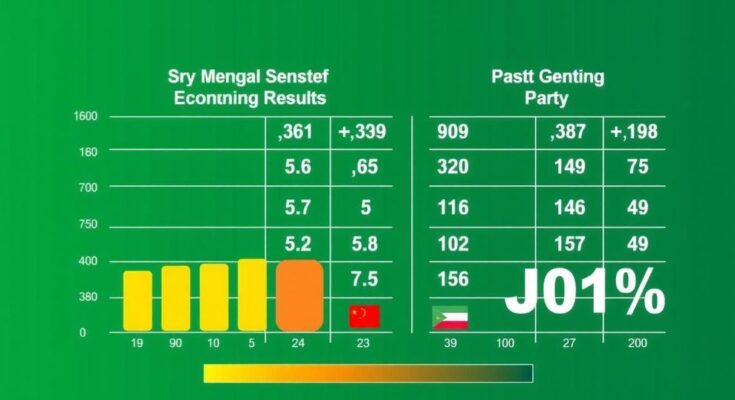The Senegalese government has announced a significant victory for the ruling party, Pastef, in the legislative elections, which grants President Bassirou Diomaye Faye a mandate for reforms. The election process faced some minor incidents but concluded peacefully, with opposition leaders conceding defeat. Former President Macky Sall has alleged electoral fraud but has not provided evidence. The government will need to confront challenges related to unemployment and public finances moving forward.
The Senegalese government has declared a significant victory in the recent legislative elections held on Sunday, with preliminary results indicating that the ruling party, Pastef, has achieved a substantial majority. This triumphant outcome is crucial for President Bassirou Diomaye Faye, as it empowers him to advance his ambitious economic and social reform agenda, which was the cornerstone of his campaign in March. Following the election, opposition leaders, including former Prime Minister Amadou Ba and Dakar’s mayor Barthelemy Dias, conceded defeat before the final vote count was completed. The elections were conducted without major incidents, although there were minor altercations among rival party supporters in the days leading up to the polls. Government spokesperson Amadou Moustapha Ndieck Sarre expressed gratitude toward the Senegalese populace for their support and the perceived mandate they have granted to Pastef. Despite the claim of victory, Pastef has yet to announce the total number of seats won, although they require 83 out of 165 for a majority in the National Assembly. The relatively new administration, guided by President Faye and Prime Minister Ousmane Sonko, who was previously barred from presidential candidacy, has encountered challenges in passing reforms within a parliament dominated by opposition parties. Their campaign focused on sweeping changes, emphasizing a strong Afrocentric and nationalist approach while vowing to reshape Senegal’s historical ties with France, the prior colonial power. At 44 years old, President Faye, recognized as Africa’s youngest leader, has made commitments towards economic reform, social justice, and anti-corruption measures that resonate particularly with the youth demographic in the country. Nevertheless, the government must navigate considerable obstacles, including high unemployment rates and unstable public finances. Former President Macky Sall, currently operating from abroad, has alleged electoral fraud by Pastef but has not presented any substantiating evidence.
The recent legislative elections in Senegal represent a pivotal moment in the nation’s political landscape. The ruling party, Pastef, seeks to solidify its power base to implement reforms promised during the presidential election campaign. As President Faye and Prime Minister Sonko strive to push their agenda forward, their administration faces scrutiny from opposition leaders alleging misconduct. This context is crucial for understanding the implications of the election results for governance and socio-economic stability in Senegal.
In conclusion, the Senegalese government’s declaration of victory for Pastef in the legislative elections is a critical step towards enabling President Faye to fulfill his reform agenda. While the ruling party has yet to provide specific seat counts, the need for a majority in the National Assembly is evident. The prevailing challenges associated with governance, economic reform, and allegations from opposition leaders highlight the complexities that lie ahead for the new administration as it moves to implement its policies amid accusations of electoral irregularities.
Original Source: www.bbc.com




